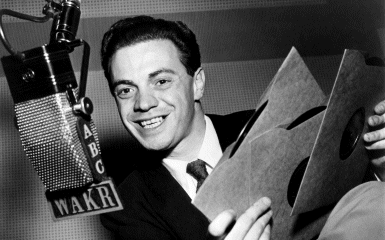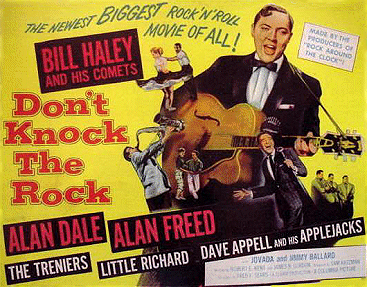Sixties
City presents
a wide-ranging series of
articles on all aspects of the Sixties, penned by the creator of the iconic
60s music paper Mersey
Beat
|
Sixties
City presents
a wide-ranging series of
articles on all aspects of the Sixties, penned by the creator of the iconic
60s music paper Mersey
Beat
|
|||||
|
| The man
who coined the phrase 'rock and roll' but wasn't allowed to patent the name!
He was born Albert James Freed near Johnstown, Pennsylvania, on 15th December
1921 and began playing trombone at high school in a band called Sultans
of Swing. Freed had ambitions of becoming a bandleader, but an ear infection
put paid to his plans. 1942 saw his first job in broadcast at WKST in New
Castle, Pennsylvania. Three years later he'd moved on to WAKR in Akron,
Ohio and in 1949 was working for WXEL-TV in Cleveland. On 11th July 1951, under the name Moondog, he began referring to r&b as rock and roll on his radio shows in the very first American radio show to play r&b records aimed at a white teenage audience. It was suggested that he wanted a name to give to the rhythm and blues records he played, but didn't want to use that name because of the racial prejudice of the time, so he came up with an alternative - rock and roll. His show was now called 'The Moondog Rock Roll House Party'. Freed also had a policy of never playing white cover versions of black artists' records. By September 1954 he had moved to WINS radio in New York. While in New York he began to promote shows at the Brooklyn and Paramount theatres and, by 1957, ABC TV had given him his own nationally networked rock and roll show. Unfortunately, white bigots protested when Frankie Lymon was seen dancing with a white girl and the company cancelled the show. In 1956 he became known to European audiences when he recorded a half hour weekly show for Radio Luxembourg called 'Jamboree'. Luxembourg announced him as "the remarkable American disc jockey whose programmes in the States cause excitement to the fever pitch'. He also recorded various singles and albums under the name Alan Freed and his Rock And Roll Band With Alan Freed's Rock And Rollers, mainly on the Coral label. They included singles such as 'Right Now, Right Now', 'I Need Lotsa Money', 'Rock and Roll Boogie' and 'Stop Look And Run' together with albums such as 'Rock 'n' Roll Dance Party', 'Go Go Go - Alan Freed's TV Record Hop' and 'Alan Freed - and This Is Rock 'n' Roll'. |
 |
 |
Freed
then became involved in a 'payola' scandal in November 1959 (even though
payola was not illegal until 1960) and he was to say that he had only claimed
payment from record companies as a 'consultant'. The case went on for some
time and in 1962 he pleaded guilty to two of the charges of commercial bribery
and was fined $300. However, in the meantime, WINS had dropped his contract
and he'd moved to KDAY radio in Los Angeles but the station refused to allow
him to promote live shows so he left the station and moved back to Manhattan
where he began to promote some live shows. On the move again, he settled in Miami at WQAM but only lasted for two months. His career, due to the payola scandal, was effectively over and he became depressed and took to drink. He died in Palm Springs, California, on 20th January 1965 of bleeding oesophageal varices and cirrhosis of the liver. His major contribution to rock and roll was finally acknowledged in 1986 when he became one of the first inductees in the Rock & Roll Hall of Fame in Cleveland when he was made a charter member as a non-performer. He was also inducted into the Radio Hall of Fame in 1988 and in 1991 he received a star on the Hollywood Walk of Fame. As the first disc jockey in America to actively promote and play records by black artists for white audiences, his contribution to the development and popularity of rock and roll was immense, hence the acknowledgement in numerous films. He appeared as himself in 'Rock Around The Clock' (1956), 'Don't Knock The Rock' (1956), 'Rock Rock Rock' (1956), 'Mister Rock And Roll' (1957) and 'Go, Johnny Go' (1959). In 'Rock Rock Rock' he was to tell the audience "Rock and roll is a river of music that has absorbed many streams: rhythm and blues, jazz, ragtime, country songs and folk songs. All have contributed to the big beat". Judd Nelson starred as Freed in the 1999 television biopic 'Mr Rock 'n' Roll: The Alan Freed Story'. Freed has also been portrayed by other actors: Tim McIntire in 'American Hot Wax' (1978), a film also based on Freed's life; Jeffrey Alan Chandler in 'La Bamba' (1987); Robert Lesser in 'Great Balls of Fire' (1989) and Tom Clark in 'Ray' (2004). In his personal life Freed married Betty Lou Beam in 1943 when they were both 21 years old. They had two children, Alana and Lance. The couple divorced in 1949 and Betty Lou was awarded custody of the children. His second marriage was to Marjorie J. Hess in 1950 and they also had two children, Sieglinde and Alan Freed Jr. They divorced in 1958 and Marjorie was awarded custody of the children. His third marriage was to Inga L. Bolingwhom in 1959. |
|
Article
Text
UK
web hosting by
|